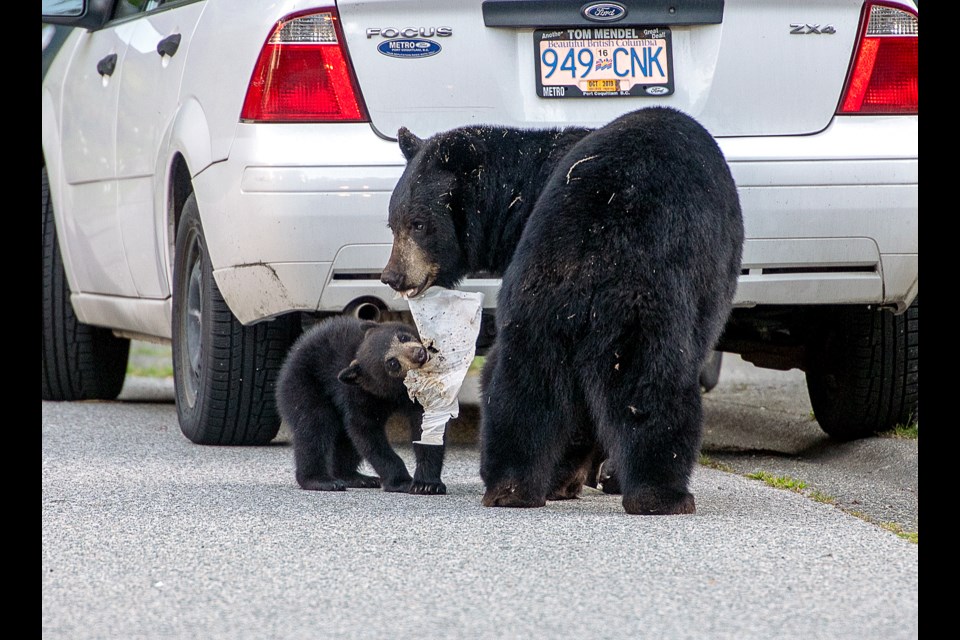
This season has been a devastating one for bears in Metro Vancouver. About 64 bears have already been killed — I intentionally say “killed” instead of “euthanized”. Euthanasia means a mercy killing. None of these were mercy killings and all of these deaths could have been avoided. In the last two weeks alone, an entire family (sow and her two cubs) were killed in Coquitlam and another two bears were killed in Port Moody, one of which had cubs who are now orphaned. These numbers will surely increase, as it is not even fall yet, when bear activity is at its highest.
The BC Conservation Officer Service and the cities were quick to say that these were all unfortunate events and that they would have preferred to not kill the bears. Coquitlam Mayor Richard Stewart even wrote a “Requiem for the “Chineside Bears,” in which he states he is “heartbroken” and gave some useful suggestions residents can take to ensure their actions do not lead to bear deaths.
I applaud Stewart and other city officials for their personal and sincere care. But as someone who has fought for animals my entire life, including my profession as an animal rights lawyer, there is a fundamental piece missing from the mayor’s and other city and conservation officials’ comments: the fact that all of these cities and the conservation service have failed miserably in protecting bears.
Most cities in the Lower Mainland that are in bear country, including Port Moody and Coquitlam, already have bylaws that empower them to fine people who do not properly secure their garbage, or leave food attractants out, including bird feeders and ripen fruit. This year, Coquitlam issued 832 warnings and 52 tickets for leaving out unsecured garbage. This is wrong. Coquitlam should not have given warnings at all, and instead it should have fined all of these people the maximum. Port Moody, and other cities, should also increase their fines.
Cities need to adopt a zero-tolerance policy for violation of these bylaws. For city officials to say they are “heartbroken” is not enough. Cities must go much further in putting their feelings into action. No more playing nice guy. It’s time to get serious with bylaws.
The BC Conservation Officer Service must also have a fundamental shift in attitude. It has lost the confidence of the public, with good reason. I, for one, am the first to encourage people to not call conservation officers when they see a bear in the community, as it will likely result in a bear’s death sentence.
Conservation officers repeatedly say they have to kill the bears because the animals become habituated to human garbage or residential areas. But was it really necessary to kill? It is one thing if there is an imminent threat, which rarely happens. Bad things can happen sometimes. But this does not mean that the standing policy of the BC Conservation Officer Service should be to kill, or even relocate, the bears from the neighbourhood upon seeing them, even if they repeatedly see the same bear (I also question whether officials know, with certainty, that they are observing the same bear).
If a bear has become habituated to a residential area, is it because of a particular household’s garbage, or other attractants, like fruit trees? If a city or conservation official knows that a bear has become habituated to a certain area because of people not securing their garbage, for example, then they obviously know that it is because of certain delinquent households. These residents should be automatically fined. No warnings. Just maximum fines. It may sound draconian, but from a bear’s perspective, it is far less draconian than having being killed.
If a bear is habituated to a certain area, perhaps it is because the area is also the bear’s territory. We seem to forget, or ignore, that these residential areas were, and remain, the homes of bears first. We came into their home, destroyed it, and now expect to live without danger, while leaving garbage out, planting tempting fruit trees, and otherwise being careless around bears. How arrogant are we, as a species, to believe that we can completely disregard the wildlife around us, to the point that it results in their unnecessary deaths.
Residents, such as my family of bear country communities, also have an ethical and legal obligation to do everything we can to reduce our potential impact on bears, such as what we do in our household already: ensuring that garbage and compost bins are properly secured and locked at all times (except for garbage pick up days), removing attractants like ripened fruit, freezing stinky garbage until pick up days, removing bird feeders during bear season and generally leaving the bears alone (for example, do not run after them with a camera).
I can hear people yelling at me now: “Bears are dangerous. How would you like it if a bear attacked your pet or child?"
My response: The most dangerous animal is we humans. We are the cause of their killings. Bears are far more scared of us than we are of them and they would much rather have nothing to do with us.
None of this is rocket science. It is very simple. We are lucky to live in an area with such beautiful wildlife. Let’s keep it that way.
Rebeka Breder is an animal law advocate and founded the first Animal Law section of the Canadian Bar Association in Canada. She is also a founder of the UBC Animal Law course and has been its adjunct professor.
www.brederlaw.com and Twitter @animallawcanada.



